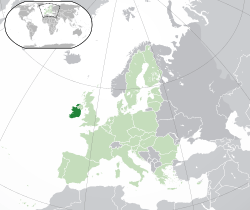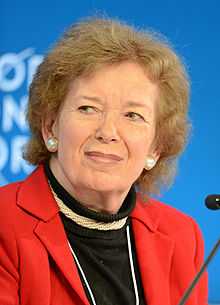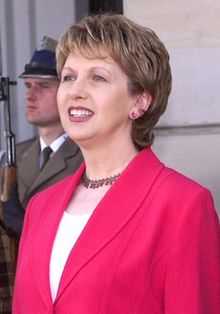LGBT rights in the Republic of Ireland
- "LGBT rights in Ireland" redirects here. For LGBT rights in Northern Ireland, see LGBT rights in the United Kingdom.
| LGBT rights in Ireland | |
|---|---|
|
Location of the Ireland (dark green) – in Europe (light green & dark grey) | |
| Same-sex sexual activity legal? | Legal since 1993, with an equal age of consent |
| Military service | Allowed to serve openly |
| Discrimination protections | Sexual orientation protections (see below) |
| Family rights | |
| Recognition of relationships | Civil partnerships since 2011 (Civil Registration Act 2004 limits marriage to man/woman) |
Today, attitudes in Ireland towards lesbian, gay, bisexual, and transgender (LGBT) people are increasingly liberal. However, sexual minorities still face some legal challenges. Both male and female same-sex sexual activity is legal in the state. Government recognition of LGBT rights in Ireland has expanded greatly over the past two decades. Homosexuality was decriminalised in 1993, and most forms of discrimination based on sexual orientation are now outlawed. Ireland also forbids incitement to hatred based on sexual orientation.
In 2015 a survey of 1000 individuals in Ireland found that 78% of people are in support of same-sex marriage and 71% of people think that same-sex couples should be allowed to adopt.[1] A 2013 survey showed that 73% of Irish people agreed that "same sex marriage should be allowed in the Constitution".[2][3] Earlier, a 2008 survey showed that 84% of Irish people support civil marriage or civil partnerships for same-sex couples, with 58% supporting full marriage rights in registry offices. The number who believe same-sex couples should only be allowed to have civil partnerships fell from 33% to 26%.[4] A March 2011 The Sunday Times poll showed support for full civil marriage rights at 73%.[5]
In July 2010, the Dáil (House of Representatives) and the Seanad passed the Civil Partnership and Certain Rights and Obligations of Cohabitants Act 2010, recognising civil partnerships between same-sex couples. The Bill passed all stages in the Dáil, without the need for a vote, and by a margin of 48 votes to 4 in the Seanad (Senate). The bill was supported by all parties, although individual politicians have criticised the legislation.[6] Since the Civil Partnership legislation has been fully enacted and implemented from the start of 2011,[7] gay and lesbian couples have been able to register their relationship before a registrar.[8] The bill was signed by President Mary McAleese on 19 July 2010.[9] The Minister for Justice signed the commencement order for the act on 23 December 2010. The law then came into force on 1 January 2011. Due to the three-month waiting period for all civil ceremonies in Ireland, it had been expected that the first Civil Partnership ceremonies would take place in April.[10] However, the legislation does provide a mechanism for exemptions to be sought through the courts, and the first partnership, which was between two men, was registered on 7 February 2011.[11] The first publicly celebrated Irish civil partnership under the Act took place in Dublin on 5 April 2011.[12] Further equality for same-sex couples within a civil partnership can now adopt children since 6 April 2015.
Law regarding same-sex sexual activity
Same-sex sexual activity was decriminalised in 1993. This was the result of a campaign by Senator David Norris and the Campaign for Homosexual Law Reform which led to a ruling in 1988 that Irish laws prohibiting male homosexual activities were in contravention of the European Convention on Human Rights. The Campaign for Homosexual Law Reform was founded in the 1970s to fight for the decriminalisation of male homosexuality, its founding members including Senator Norris and former Presidents of Ireland Mary McAleese and Mary Robinson. Prior to 1993 certain laws dating from the nineteenth century rendered male homosexual acts illegal. The relevant legislation was the 1861 Offences Against the Person Act, and the 1885 Criminal Law (Amendment) Act, both enacted by the Parliament of the United Kingdom before Irish independence, and having been repealed in England and Wales in 1967, Scotland in 1980 and Northern Ireland in 1982.
In 1983 David Norris took a case to the Supreme Court seeking to challenge the constitutionality of these laws but was unsuccessful. In its judgement (delivered by a 3–2 majority) the court referred to the "Christian and democratic nature of the Irish State" and argued that criminalisation served public health and the institution of marriage.
In 1988 Norris took a case to the European Court of Human Rights to argue that Irish law was incompatible with the European Convention on Human Rights. The court, in the case of Norris v. Ireland,[13] ruled that the criminalisation of male homosexuality in the Republic violated Article 8 of the Convention, which guarantees the right to privacy in personal affairs. The Oireachtas (Irish parliament) decriminalised male homosexuality five years later, when the Minister for Justice, Maire Geoghegan-Quinn, in the 1992–1994 Fianna Fáil—Labour coalition government included decriminalisation with an equal age of consent (an equal age of consent was not required by the ECHR ruling) in a Bill to deal with various sexual offences. None of the parties represented in the Oireachtas opposed decriminalisation. Coincidentally, the task of signing the Bill decriminalising male homosexual acts fell to the then President of Ireland, Mary Robinson, an outspoken defender of gay rights who as a barrister and Senior Counsel had represented Norris in his European Court of Human Rights case.
Recognition
Marriage
.jpg)
Marriage in Ireland is currently regulated by the Civil Registration Act 2004.[14] Section 2 restates the Common Law definition of marriage and according to section 2(2)(e) a marriage would be invalid if both parties to a marriage are of the same sex. Therefore Ireland does not allow same-sex marriage.
The Irish courts first dealt with the case of same-sex marriage in the case of Foy v. An t-Ard Chláraitheoir & Ors.[15] In that case, Dr Foy was a male-to-female transsexual and sought a finding that she was born female but suffered from a congenital disability and claimed that the existing legal regime infringed her constitutional rights to marry a biological man. In support of her claim, she relied on case law from the ECHR. McKechnie J noted that in Ireland it is crucial that parties to a marriage be of the opposite biological sex. The judge noted that Article 12 of the ECHR is equally predicated. Accordingly, he found that there was no sustainable basis for the applicant's submission that the law which prohibited her from marrying a party of the same biological sex as herself, was a violation of her constitutional right to marry. The judge concluded that the right to marry is not absolute and has to be evaluated in the context of several other rights including the rights of society. Therefore, the state is entitled to hold the view which is espoused and evident from its laws.
The Irish Supreme Court returned Foy's case to the High Court in 2005[16] to consider the issues in light of the Goodwin decision[17] of the ECHR. Foy had also issued new proceedings in 2006 relying on a new ECHR Act, which gave greater effect to the European Convention on Human Rights in Irish law. The two cases were consolidated and were heard in April 2007. Dr Foy stressed the Goodwin decision where the European Court of Human Rights had found that the UK had breached the rights of a transgender woman, including her right to marry. McKechnie J was very reproachful of the government in his judgment and asserted that, because there is no express provision in the Civil Registration Act, which was enacted after the Goodwin decision, it must be questioned as to whether the State deliberately refrained from adopting any remedial measures to address the ongoing problems. He emphasised that Ireland is very much isolated within the member states of the Council of Europe with regards to these matters. The judge concluded that by reason of the absence of any provision which would enable the acquired identity of Dr Foy to be legally recognised in this jurisdiction, the state is in breach of its positive obligations under Art 8 of the Convention. He issued a declaration that Irish law was incompatible with the ECHR and added that he would have found a breach of Dr Foy's right to marry as well if it had been relevant.[18]
The Labour Party,[19] the Green Party,[20] Sinn Féin,[21] the Socialist Party,[22] Fianna Fáil[23] all support the right of marriage for same-sex couples.
The new Fine Gael-Labour government agreed to establish a Constitutional Convention to consider same-sex marriage among other things.[24]
On 2 July 2013, the Constitutional Convention delivered the formal report to the Oireachtas, which had four months to respond.
Marriage Equality referendum
On 5 November 2013, the government announced that a referendum to allow same-sex marriage would be held in the first half of 2015. On 19 February 2015, Taoiseach Enda Kenny announced that the Marriage Equality referendum would take place on Friday 22 May 2015.[25] The referendum, if passed, will add the wording "Marriage may be contracted in accordance with law by two persons without distinction as to their sex" to the Irish constitution.[26]
Civil partnership
The Civil Partnerships Bill 2009 was presented to the Cabinet on 24 June 2009 and was published on 26 June 2009.[27] Although most LGBT advocacy groups cautiously welcomed the Government's legislation, there have been criticisms of the proposals. One major criticism states that the legislation effectively enshrines discrimination in law insofar as separate contractual arrangements with greater privileges will continue to exist for opposite-sex marriages concurrent to lesser arrangements for those wishing to take out Civil Partnerships. In particular, the denial of the right to apply to adopt rights to couples with a Civil Partnership has been cited as particularly discriminatory.[28][29]
The bill will represent the culmination of detailed work between the parties of the governing coalition. With the entering into government of the Green Party with Fianna Fáil & the Progressive Democrats in June 2007, civil partnership legislation moved up the political agenda. On 16 July 2007, Taoiseach Bertie Ahern said that "we will legislate for Civil Partnerships at the earliest possible date in the lifetime of this Government."[30] Following a cabinet meeting on 30 October 2007, the government said it would introduce legislation by the end of March 2008 and expected the bill to pass within a year of that. As of the end of April, no legislation had been presented by the cabinet, though many speculated that this was due to the resignation of Bertie Ahern as Taoiseach over the same period.
The bill passed all stages in Dáil Éireann on 1 July 2010 with cross-party support resulting in it passing without a vote,[31] and passed by a margin of 48 votes to 4 in the Seanad (Senate) on 9 July.[32] It grants gay couples several rights now only granted to married couples, but does not recognise children raised by gay couples as being their children. Irish law only allows gay people to adopt children as individuals while allowing gay couples to jointly foster. It also grants cohabitants, both gay and straight, who have lived together for at least five years limited rights in an opt-out scheme where a former partner could apply to court on the breakdown of a relationship to make the other former partner provide financial support to him/her. The bill was signed into law by President Mary McAleese on 19 July. Gay activist Grace Margaret Coleman welcomes the introduction of the recent bill but stated on Midlands 103 that 'the introduction of the bill should only be viewed as a stepping stone to full gay marriage and the struggle for proper recognition of lesbian women in Ireland is still ongoing.' [9]
Discrimination protections
Discrimination on the basis of sexual orientation is outlawed by the Employment Equality Act, 1998[33] and the Equal Status Act, 2000.[34] These laws forbid discrimination in any of the following areas: employment, vocational training, advertising, collective agreements, the provision of goods and services, and other publicly available opportunities.
The protections provided remain uneven. As pointed out at page 26 in Review, the Journal of the Public Service Executive Union, July/August, 2014, Section 81E (5) of the Pensions Act 1990, as amended, prevents pensioners, who retired more than one year before the Civil Partnership Act, 2010, from challenging the refusal of a survivor's pension for their civil partner. The Government uses this section to block legal attempts by LGBT people to obtain pensions.
Section 37 of the Employment Equality Act, does however allow religious organisations, medical institutions or educational institutions an exemption on employment grounds. If such an organisation wants to maintain the religious ethos or prevent the religious ethos from being undermined then it is not illegal under section 37 for them to discriminate. This applies to employment only. Groups such as the Irish Congress of Trade Unions, the Irish National Teachers Organisation, the Irish Labour Party & Sinn Féin want to abolish section 37.
The Prohibition of Incitement to Hatred Act, 1989 outlaws incitement to hatred based on sexual orientation. The penalties for violating this law are sentenced up to a fine not exceeding £1,000 or to imprisonment for a term not exceeding 6 months or to both on the first offense, or on conviction on indictment, to a fine not exceeding £10,000 or to imprisonment for a term not exceeding 2 years or to both.[35]
Gender identity
Sex changes are not legally recognised by Ireland. On 19 October 2007 Dr. Lydia Foy won her case in the High Court which ruled that the failure to allow her to obtain a new birth certificate recording her gender as female was in breach of her rights under the ECHR.[36] The Government appealed this decision but dropped its appeal in June 2010 and stated it would introduce legislation in the future.[37] A new Government took office in February 2011 and following the report of an advisory committee in July 2011, the Minister responsible announced that the Government would introduce gender recognition legislation as soon as possible.[38] No legislation had been introduced by February 2013 and Dr. Foy commenced new legal proceedings seeking to enforce the decision made by the High Court in 2007.[39] In June 2014, a gender recognition bill was announced and in September 2014, the government stated that it will be published by the end of the year.[40] As of April 2015, no gender identity recognition bill has been introduced.
Adoption and parenting
Irish adoption law currently only allows for applications to adopt children by married couples or single applicants. It is therefore not possible for a gay couple to jointly apply to adopt, but a single gay person or one partner of a couple may apply. Even though joint-adoption by a gay couple is not possible, a same-sex couple may submit a joint application to foster children. Additionally, lesbian couples can get access to IVF and assisted insemination treatment. In January 2014, Government Minister for Justice and Equality Alan Shatter announced that the government intends bringing in laws by the end of the year to extend guardianship, custody, and access rights to the non-biological parents of children in same-sex relationships and children born through surrogacy and sperm and egg donation.[41]
On 21 January 2015, the Government announced that a revised draft of the Children and Family Relationships Bill will give cohabitating couples and those in civil partnerships full adoption rights. The bill is set to become law before the May same-sex marriage referendum.[42] The Bill was published on 19 February 2015, and was subsequently passed by the Dail. It then moved to the Senate, where debate began on 24 March.[43][44] The bill was passed by the Senate on 30 March 2015.[45] The Children and Family Relationships Bill was signed into law on April 6, 2015[46] The law is due to commence very soon.
Blood donations
The Irish Blood Transfusion Service has placed a life ban on donations from males who have ever had anal or oral sex with another male. Groups such as the Union of Students in Ireland & Sinn Féin have been campaigning for this ban to be repealed, but were unsuccessful. Currently this is under review.
Summary table
| Same-sex sexual activity legal | |
| Equal age of consent | |
| Anti-discrimination laws in employment only | |
| Anti-discrimination laws in the provision of goods and services | |
| Anti-discrimination laws in all other areas (incl. indirect discrimination, hate speech) | |
| Same-sex marriages | |
| Recognition of same-sex couples (e.g. civil partnership) | |
| Step-child adoption by same-sex couples | |
| Joint adoption by same-sex couples | |
| Gays and lesbians allowed to serve openly in the military | |
| Access to IVF for lesbians | |
| Right to change legal gender | |
| MSMs allowed to donate blood | |
See also
- Campaign for Homosexual Law Reform (Ireland)
- Recognition of same-sex unions in Ireland
- List of Laws and Reports on Gay and Lesbian Rights in Ireland
- LGBT rights in Europe
- Non-gender specific definition of Family in the Constitution, Bunreacht na hÉireann, An Teaghlach, Airteagal 41.3.1°), from Wiktionary.
- Gay and Lesbian Equality Network (GLEN)
References
- ↑ "Family Values: 54% would be willing to help a relative die". Irish Times. 21 March 2015. Retrieved 21 March 2015.
- ↑ McEnroe, Juno (23 February 2012). "Poll: 73% of public back allowing same-sex marriage in Constitution". Irish Examiner. Retrieved 14 March 2012.
- ↑ "Overwhelming Majority Support Gay Marriage In Ireland". Gay Community News. Retrieved 14 March 2012.
A new Red C poll shows that 73% are in agreement with the statement "same sex marriage should be allowed in the Constitution"
- ↑ "Increased support for gay marriage – Survey". BreakingNews.ie. 31 March 2008.
- ↑ Poll: Three-Quarters In Favour Of Gay Marriage
- ↑ "Civil partnership bill backed by Irish politicians". BBC News. 1 July 2010. Retrieved 11 July 2010.
- ↑ Connolly, Niamh (11 July 2010). "Civil unions will have to wait until 2011". Thepost.ie. Retrieved 9 January 2011.
- ↑ http://www.irishtimes.com/newspaper/breaking/2010/0702/breaking4.html?via=mr Civil Partnership Bill – Irish Times 2/7/10
- ↑ 9.0 9.1 "Civil Partnership Bill signed into law". The Irish Times. 19 July 2010. Retrieved 9 January 2011.
- ↑ "Ahern announces commencement of Civil Partnership and Cohabitants Act". Justice.ie. Retrieved 9 January 2011.
- ↑ http://www.irishexaminer.com/ireland/kfeyojsncwey/rss2/
- ↑ First Irish public civil partnership services
- ↑ "NORRIS v. IRELAND – 10581/83 [1988] ECHR 22 (26 October 1988)". Worldlii.org. Retrieved 11 July 2010.
- ↑ "ACTS04$$U3" (PDF). Retrieved 11 July 2010.
- ↑ "Foy v. An t-Ard Chlaraitheoir & Ors [2002] IEHC 116 (9 July 2002)". Bailii.org. Retrieved 11 July 2010.
- ↑ "Foy -v- An t-Ard Chláraitheoir & Ors [2007] IEHC 470 (19 October 2007)". Bailii.org. Retrieved 11 July 2010.
- ↑ "ECHR Portal HTML View". Cmiskp.echr.coe.int. Retrieved 11 July 2010.
- ↑ "Foy v. An t-Ard Chlaraitheoir & Others 2007 IEHC 470" (http://www.bailii.org.ie/cases/IEHC/2007/H470.html). 19 October 2007.
- ↑ "Press releases » Media centre » The Labour Party". Labour.ie. 7 May 2009. Retrieved 11 July 2010.
- ↑ "1.2 Providing for Same-Sex Marriage / Marriage / Marriage and Partnership Rights / Policies / Home – Green Party / Comhaontas Glas". Greenparty.ie. Retrieved 11 July 2010.
- ↑ "Recognition of same sex marriage long overdue | Sinn Féin". Sinnfein.ie. 31 March 2004. Retrieved 11 July 2010.
- ↑ Pride 09 - Full Same Sex Marriage Rights Now!
- ↑ McGee, Harry (5 March 2012). "Chastened Soldiers of Destiny begin the march to renewal and reform". The Irish Times. Retrieved 14 March 2012.
Another clear sign was the success of motions on same-sex marriage and allowing same-sex couples to adopt.
- ↑ RTÉ News (PDF) http://www.rte.ie/news/2011/0306/programme_for_national_government.pdf. Missing or empty
|title=(help) - ↑ . RTÉ News. 19 February 2015 http://www.rte.ie/news/2015/0219/681528-referendum/. Missing or empty
|title=(help) - ↑ "Government announces wording for Marriage Equality referendum". Department of Justice and Equality. 2015-01-21. Retrieved 2015-02-19.
- ↑ "Civil Partnership Bill published". RTÉ News (RTÉ). 26 June 2009. Retrieved 26 June 2009.
- ↑ "Civil partnership expected to fail lesbian and gay community » News » MarriagEquality – Civil Marriage for Gay and Lesbian People in Ireland". Marriagequality.ie. 24 June 2008. Retrieved 11 July 2010.
- ↑ "GLEN / Gay and Lesbian Equality Network / Home". Glen.ie. Retrieved 11 July 2010.
- ↑ Grew, T. "Ireland to get civil partnerships", [Pinknews.co.uk], 17 July 2007. Retrieved 18 July 2007.
- ↑ "Dáil passes Civil Partnership Bill". The Irish Times. 1 July 2010. Retrieved 9 January 2011.
- ↑ "Seanad passes Partnership Bill". The Irish Times. 8 July 2010. Retrieved 9 January 2011.
- ↑ "Employment Equality Act, 1998". Irishstatutebook.ie. 18 June 1998. Retrieved 11 July 2010.
- ↑ "Equal Status Act, 2000". Irishstatutebook.ie. 26 April 2000. Retrieved 11 July 2010.
- ↑ "Prohibition of Incitement To Hatred Act, 1989". Irishstatutebook.ie. 29 November 1989. Retrieved 11 July 2010.
- ↑ "Irish Times, October 20th 2007 :". Irishtimes.com. 10 October 2007. Retrieved 11 July 2010.
- ↑ "Order of the High Court : Foy – v – the Registrar General, Ireland & the Attorney General » 2010 » Press Releases » Press Office » Department of Social Protection". Welfare.ie. Retrieved 11 July 2010.
- ↑ "Gender recognition legislation move a step along the way" Irish Examiner. 15 July 2011. Retrieved 4 March 2013.
- ↑ "Transgender woman to sue over birth certificate delay" (http://www.irishtimes.com/newspaper/ireland/2013/0227/1224330566731.html). The Irish Times. 27 February 2013. "Dentist in new gender legal bid" (http://www.irishexaminer.com/ireland/dentist-in-new-gender-legal-bid-223996.html) Irish Examiner. 28 February 2013. Retrieved 4 March 2013.
- ↑ "Gender recognition bill to be published by end of the year". pinknews. 17 September 2014.
- ↑ "Equal parent rights for gay couples". Irish Examiner. 22 January 2014. Retrieved 26 January 2014.
- ↑ Gay adoption law due before the same-sex marriage referendum
- ↑ Children and Family Bill published on Oireachtas website
- ↑ Children and Family Relationships Bill 2015: Second Stage
- ↑ Children and Family Relationships Bill Passes In Seanad
- ↑
Bibliography
- Bertie Ahern opens gay rights organisation
- Employment Equity Act, 1998
- Equal Status Act, 2000.
- Norris v. A.G. – [1983] IESC 3; [1984] IR 36 (22 April 1983)– Supreme Court judgement affirming the law criminalising homosexuality
- Norris v. Ireland – 10581/83 [1988] ECHR 22 (26 October 1988)– European Court of Human Rights judgement overturning the Supreme Court ruling
- Support group for Irish Pink Adoptions
- Pat Rabbitte takes part in Pride 2006
- The blogger notes the recent decision of the Irish Cabinet to introduce some form of law enabling same sex unions by March 2008.
- Right to legal gender change won in Irish High Court, May 2008
- "Out at last!", 8 June 2008.
| Wikimedia Commons has media related to LGBT in Ireland. |
| ||||||||||||||||||||||||||||||
| ||||||||||||||||||




